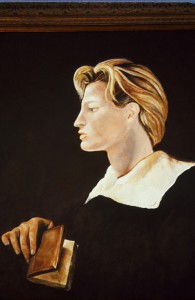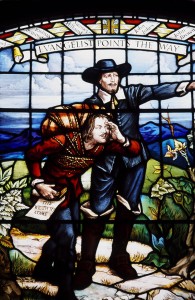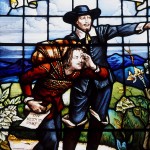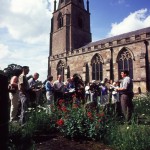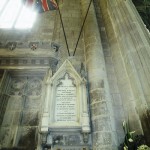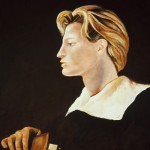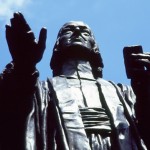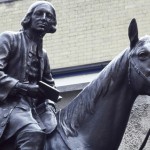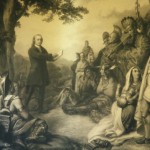Momentarily lost in thought, time and place, I wandered through England’s Gloucester Cathedral, a magnificent edifice where construction began at the behest of William the Conqueror in A.D. 1089. My reverie was suddenly broken as I gazed above me. There, hanging side by side, were two familiar flags unfurled: the Union Jack of England and my own beloved Stars and Stripes.
Beneath the companion banners was a memorial tablet to one John Stafford-Smith (1750-1836). It read: “Born in this city, a composer of great distinction. He will long be remembered as composer of the tune of the National Anthem of the United States of America.”
“Hip hip hooray!” I whispered to myself in the silent sanctuary. This was the first of many Anglo-American discoveries I hoped to make in the days ahead.
The Faith of Whitefield and Wesley
A short stroll from the cathedral, I attended a public lecture about yet another Gloucester-born giant. George Whitefield helped seed the moral landscape of New World America when it was still a British colony. A famed pulpit orator, Whitefield crossed the Atlantic seven times, beginning in 1739. He was influential in sparking America’s Great Awakening.
Long before Whitefield set foot on American sod, however, the Pilgrim Fathers, Englishmen William Brewster and William Bradford sailed to America on board the Mayflower in 1620 to found the Plymouth Colony.
Probably no other Englishman ever got a better feel for the grass roots of early America than John Wesley. On horseback, the itinerant evangelist crisscrossed the countryside before and after the War of Independence. In his lifetime, Wesley rode an estimated 250,000 miles (equivalent to ten times around the globe!), preaching 42,000 sermons over a span of 53 years in the New World and Great Britain.
In central London, within the historic Bunhill Fields Cemetery, I found a virtual Hall of Fame of those whose ideals and endeavors sowed the seeds for the new nation. Resting here are Susanna Wesley, mother of nineteen children, all of whom she home-schooled, including sons John (founder of Methodism) and Charles (composer of 6,000 hymns); John Bunyan, author of the Pilgrim’s Progress and Isaac Watts, the prolific writer of such hymns as Joy to the World.
Contributing much to contemporary American life was the talented C.S. Lewis; especially to children for his classics like Chronicles of Narnia. I visited his home “The Kilns” and kneeled by his simple grave nearby.
Amazing Faith, Amazing Grace
Perhaps my most poignant encounter for my quest for the British beginnings of American faith occurred in the quaint town of Olney, known for its bonds to John Newton.
Former slave trader, he was miraculously “born again” and worked to abolish slavery throughout the British Empire. Upon leaving the town church he pastored later in life, I heard a traditional American melody being sung in the church’s burial ground. The words were familiar, too: “Amazing Grace” written by Newton himself to celebrate his redemption from a life of cruelty and sin.
So my final discovery, as with my first, confirmed many of the moral moorings that guide me through life today in the USA, were firmly planted long ago, deep down in good British sod.
- “Pilgrims Progress” window in John Bunyan’s church – Evangelist Points the Way
- American pilgrims sing “Amazing Grace” at John Newton’s Olney grave
- Gloucester Cathedral memorial to British composer of American National Anthem John Stafford Smith
- George Whitefield sparked America’s First Great Awakening
- Itinerant preacher John Wesley with Bible
- John Wesley, the horseback evangelist and founder of Methodist Church
- C.S. Lewis grave, Oxford, England
- The faith of John Wesley, preaching to native American Indians
- American pilgrim prays over John Newton’s Olney grave


